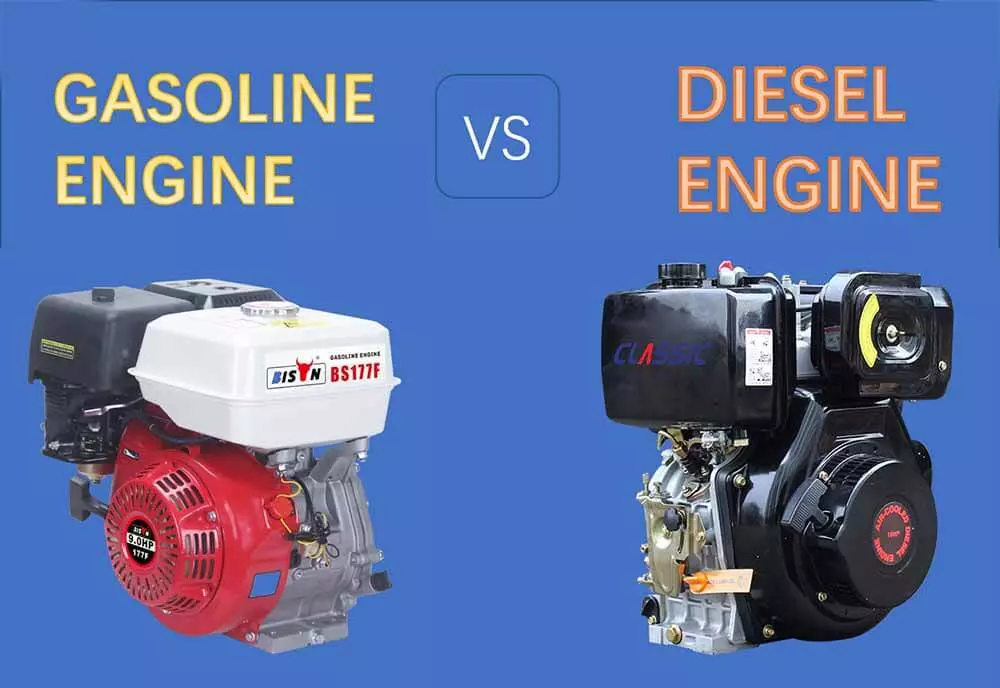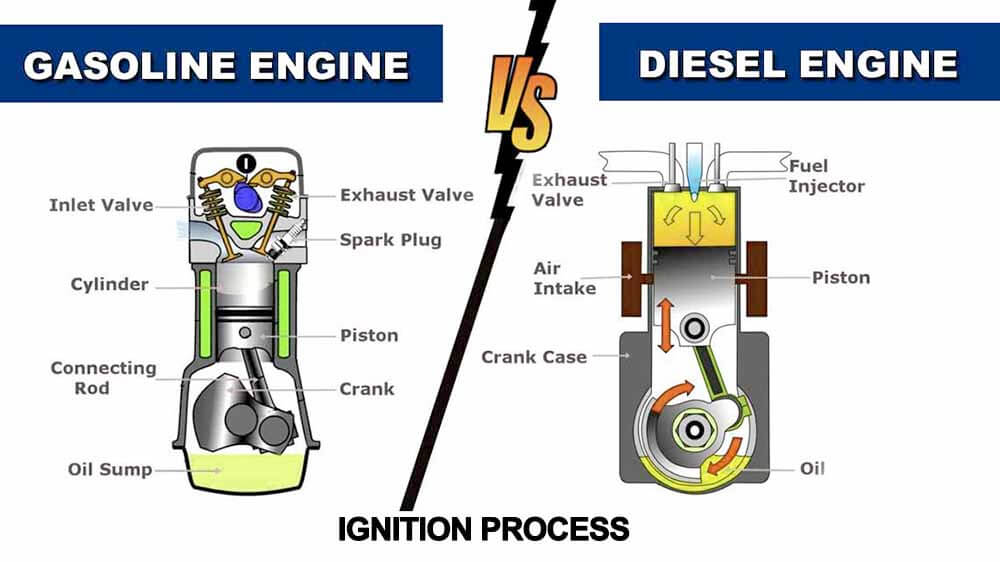19Jul 2023
table of contents

Small diesel engines vs small gasoline engines. Delve into the nitty-gritty details of efficiency, cost, environmental impact, fuel supply, noise level, and range of application. Uncover the key differences between these two powerhouse engines in this comprehensive comparison.
Small gasoline engine: This engine works in four steps. It first takes in a mix of air and fuel, then compresses it. A spark plug ignites this compressed mixture, creating power. Finally, the engine expels the burnt gases.
Small diesel engine: This engine also works in four steps but differently. It first takes in only air and compresses it. Then it injects fuel into this hot, compressed air, which ignites spontaneously, producing power. Lastly, it expels the burnt gases.
One major distinction lies in the ignition process: small gasoline engines utilize spark plugs, while small diesel engines depend on heat generated by compressed air.
Having discussed the basic differences between small diesel and gasoline engines, let us take a deeper look at their other differences.

The difference in how small diesel and gasoline engines work greatly affects their performance. The ignition of the small diesel engine is caused by the heat generated when the air is compressed, and has a high compression ratio. Higher fuel efficiency can be achieved compared to spark ignition small petrol engines.
Additionally, small diesel engines have a leaner air-fuel ratio that increases torque and power output at lower revs. This makes small diesel engines ideal for heavy-duty applications. BISON small gasoline engines, however, are able to rev higher and provide better performance for high-speed applications.
Although the initial cost of small diesel engines can be higher, their exceptional fuel efficiency and longevity make them more cost-effective in the long run. The robustness of a small diesel engine can compensate for the upfront expenditure over time, proving to be a financially savvy choice for many individuals. However, maintenance costs can be higher due to the complexity of small diesel engines.
Conversely, BISON small gasoline engines have a lower initial cost but can incur higher running costs due to lower fuel efficiency. They are generally low maintenance and a viable option for budget-conscious consumers.
When it comes to the environment, small diesel engines are more fuel efficient, resulting in less CO2 emissions. However, it's worth noting that these engines release higher levels of nitrogen oxides and produce more particulate matter, impacting the environment differently. On the other hand, Small gasoline engines emit less particulate matter but release more carbon dioxide. The choice between these two small engine types therefore depends on whether the priority is to reduce CO2 emissions or minimize air pollutants.
Fuel availability varies by region. Generally, diesel is commonly found. However, if gasoline is more accessible in certain areas, opting for a small petrol engine might be a more fitting decision.
Traditionally, small diesel engines were noisier and generated more vibration due to their high compression ratios, however, technological advances have resulted in significantly lower noise and vibration in newer models. Small gasoline engines are relatively quiet in operation compared to small diesel engines.
Both small engines have a wide range of applications. With high torque and durability, BISON small diesel engines are ideal for commercial vehicles, large commercial generators and heavy machinery. Conversely, small gasoline engines are better suited for passenger cars and light-duty applications such as power tiller, small appliances and pressure washers due to their high-speed capabilities.
Small Petrol vs Diesel Engine in Tabular Form
| Small gasoline engine | Small diesel engine |
| Caused by a spark igniting | Air compression ignition |
| The compression ratio is relatively low | High compression ratio |
| Less efficient than diesel engines | More efficient than gasoline engines |
| High fuel consumption and relatively low power | High power, low fuel consumption |
| Less noise when working | Make more noise while working |
| Initial and maintenance costs are relatively low | High initial and maintenance costs |
| Generally used in light applications such as pressure washers | It is commonly used in large commercial generators and heavy machinery |
In conclusion, the choice between a small diesel engine or a small gasoline engine depends on many factors. Whether your priorities are efficiency, cost, environmental impact, fuel supply, noise control or specific application requirements, BISON offers reliable, durable and efficient engine solutions, as well as a full range of small diesel and gasoline engine. Welcome to consult BISON small engine professional team at any time!
inquiry form here
BISON BLOG, All the latest news and views from Bison Machinery.
Related Articles
small diesel engines electric start : comprehensive guide Small Diesel Engine VS Small Gasoline EngineRelated Products